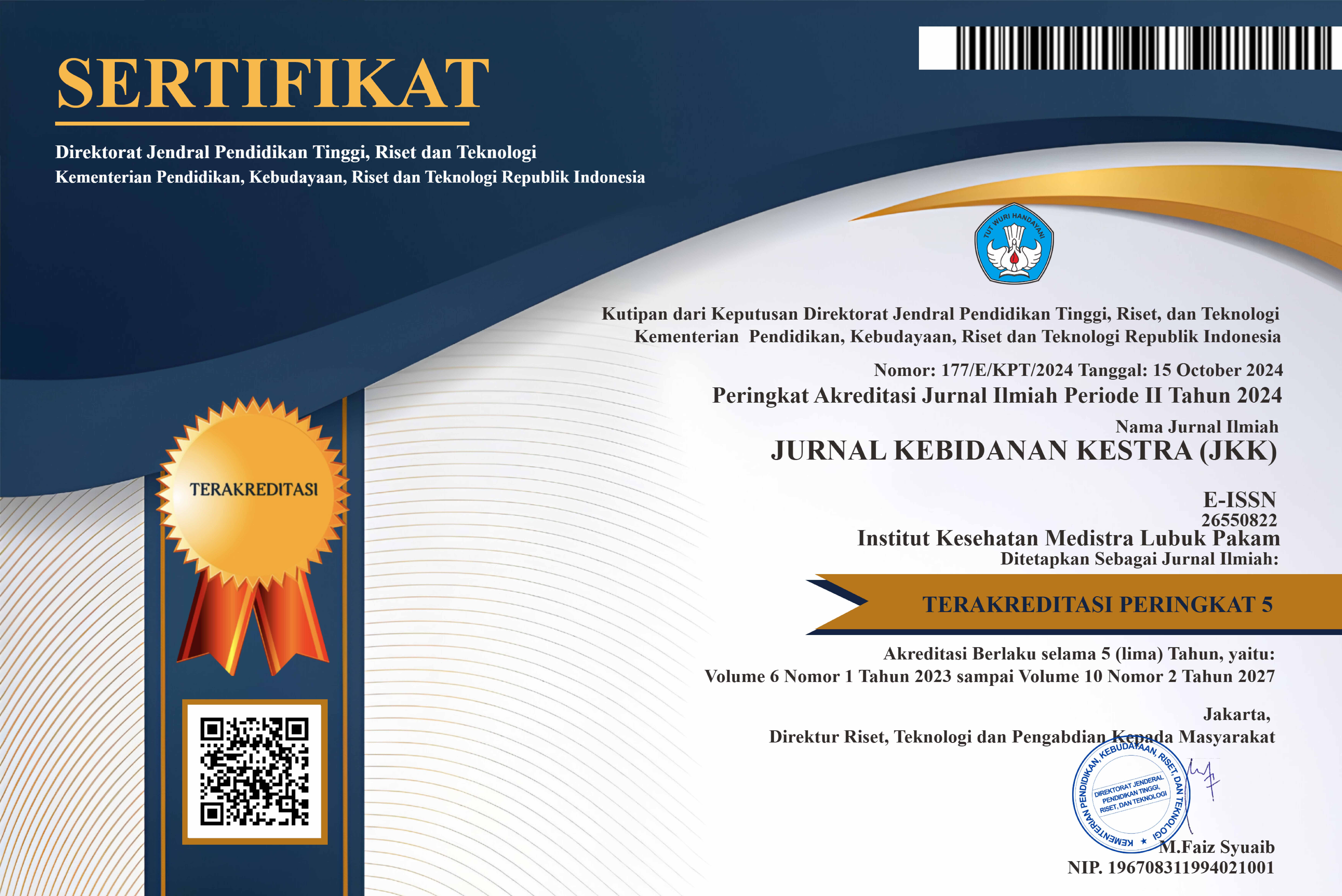Motivation and Facilities to the Compliance of Independent Midwife Practices in Recording Reporting on Maternal Child Health Services in Wonosobo
DOI:
https://doi.org/10.35451/jkk.v5i1.1185Keywords:
Compliance reporting and recording of midwive, motivation, facilitiesAbstract
Independent Practice Midwives are obliged to systematically record midwifery care and other services provided, the Wonosobo Health Office and the professional organization of the Indonesian Midwifery Association have not yet made a mutual agreement on the report form in which PMB is required to report records of Maternal and Child Health services to Puskesmas every year. month. Purpose this study was to determine the relationship between motivation and facilities on PMB compliance. Type of research is a quantitative with a cross sectional research design. Subjects was 210 PMB with a significance level of 1%, so the samples taken were 160. Sample was determined randomly using a lottery system. The data were taken using a questionnaire that had been tested for validity and reliability. Data analysis consisted of Chi Square statistical test and logistic regression analysis. The results show that there is a significant positive relationship between motivation and compliance, the value of continuity correction is 57,325 p-value = 0.0000 (p<0.05). There is a significant positive relationship between facilities and compliance with the value of continuity correction 50.897 p-value = 0.0000 (p<0.05). The motivation and facilities variables simultaneously have a significant effect on the compliance variable because the omnibus test significance value is 0.000 (p<0.01) with the coefficient of determination R square. It is explained that the motivation and facilities variables in the study are able to contribute to the compliance variable of 0.668 (66.8 %), sequentially the most influential variable on Compliance is the Motivation variable with a wald value of 29,827 followed by the Facility variable with a wald value of 26,719.
Downloads
References
Abdullah, S. M. (2019). Social cognitive theory : a Bandura thought review published in 1982-2012. Psikodimensia, 18(1), 85–100. https://doi.org/10.24167/psidim.v18i1.1708
Adriansyah, A. A., & Sjarif, S. (2016). Pengaruh Motivasi Terhadap Kinerja Bidan Dalam Pencapaian Cakupan Persalinan Di Puskesmas Kabupaten Konawe Selatan Provinsi Sulawesi Tenggara. Jurnal IKESMA, 12(02), 141–150. https://garuda.ristekbrin.go.id/documents/detail/917895
Astuti, D. A. (2013). Faktor-faktor yang Berhubungan dengan Kinerja Bidan dalam Pelaksanaan Desa Siaga di Kabupaten Boyolali Factors Associated to the Work Performance of Midwives in the Implementation. Jurnal Manajemen Kesehatan Indonesia, 01(03), 159–167.
Felina, M., & Maria, D. R. (2014). Faktor-Faktor Yang Mempengaruhi Kinerja Bidan Terhadap Cakupan PWS KIA Di Puskesmas Tigo Baleh Kota Bukittinggi Tahun 2014. Jurnal Kesehatan STIKes Prima Nusantara Bukittinggi, 5(2), 1–10.
Fitriyani, F., Zuhana, N., & Prafitri, L. D. (2018). Studi Deskriptif Pencatatan dan Pemanfaatan Kartu Ibu oleh Bidan di Kabupaten Pekalongan. Jurnal Ilmiah Bidan, III(3), 35–42. https://e-journal.ibi.or.id/index.php/jib/article/download/92/60
Hadi, S. (2015). Metodologi riset. Pustaka Pelajar.
Muninjaya, G. (2011). Menejemen mutu pelayanan kesehatan. Jakarta: EGC.
Neolaka, A. (2014). Metode penelitian dan statistik. Rosdakarya.
Palifiana, D. A., & Wulandari, S. (2017). Penerapan pendokumentasian asuhan kebidanan pada bidan praktik mandiri di kabupaten bantul. Jurnal Keperawatan Intan Husada, 4(1), 39–49.
Puteri, R. A. M., & Sukama, Z. N. K. S. (2017). Analisis beban kerja dengan menggunakan metode CVL dan NASA-TLX di PT ABC. 1(2), 121–221.
Setianingrum, W., & Purnami, L. (2014). Analisis Faktor-Faktor yang Berhubungan dengan Kepatuhan
Downloads
Published
Issue
Section
License
Copyright in each article is the property of the Author.



























